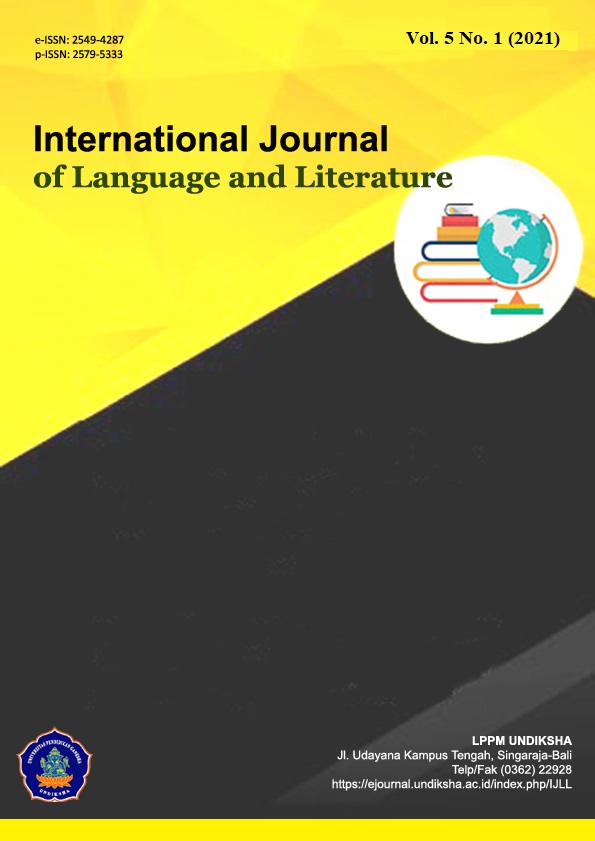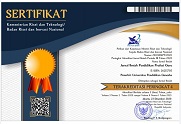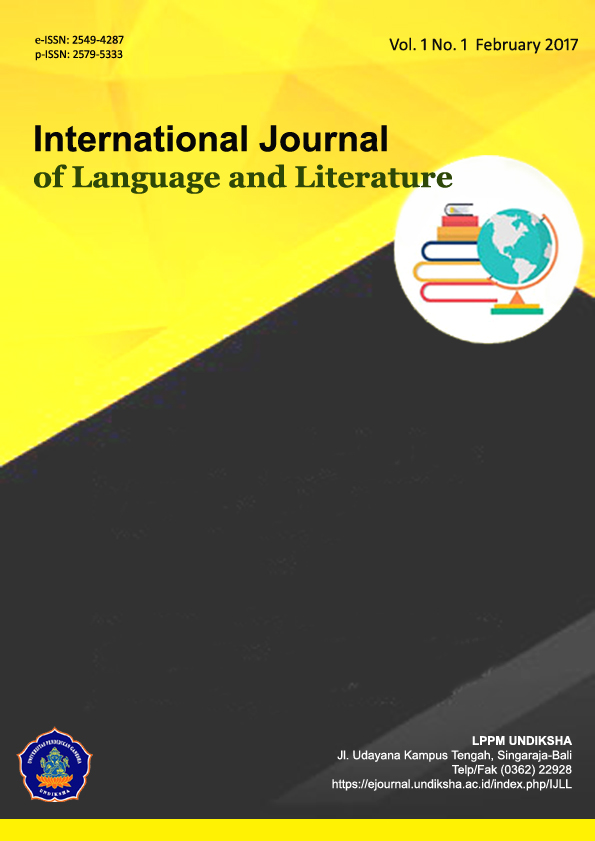MULTILINGUAL THEMATIC PICTURE DICTIONARY: ASSISTING YOUNG LEARNERS’ LITERACY
DOI:
https://doi.org/10.23887/ijll.v5i1.27694Keywords:
literacy, young learner, dictionaryAbstract
This study aimed at developing a media, named a multilingual thematic picture dictionary to support the development of fourth grade elementary school students’ literacy. This study applied Design and Development research with Analysis, Design, Development, and Evaluation model proposed by Richey and Klein (2007). The subjects of the research were the fourth grade elementary school students who studied in rural and urban area. The data in this study were obtained from observation, interview, questionnaire, document analysis, content validity judgment, and quality judgment. The data obtained were collected by using four instruments, namely; observation sheet, interview guide, questionnaire, and expert judgment sheet. The data were analyzed qualitatively and quantitatively. The results showed that the multilingual thematic picture dictionary contents were relevant to the criteria of a good multilingual thematic picture dictionary and was categorized as an excellent category.
Keywords: literacy, young learner, dictionary
References
Ali, H. I. H. (2012). Monolingual dictionary use in an EFL context. English Language Teaching, 5(7), 2–7. https://doi.org/10.5539/elt.v5n7p2 DOI: https://doi.org/10.5539/elt.v5n7p2
Akbar, A. (2017). Membudayakan literasi dengan program 6M di sekolah dasar. JPSD, 3(1), 42-52. DOI: https://doi.org/10.30870/jpsd.v3i1.1093
Arsita, N. E., & Karim, A. (2015). Media kamus tematik bergambar sebagai penunjang buku ajar löwe 2 untuk keterampilan menulis bahasa jerman di sma negeri 1 krian. Laterne, 4(1), 95-108.
Aryantika, M. E., Darmawiguna, I. G. M., & Putrama, I. M. (2015). Pengembangan Kamus Kolok Visual Berbasis Android Sebagai Media Edukatif Mempelajari Bahasa Penyandang Tuna Rungu di Desa Bengkala. Jurnal Karmapati, 4(4), 1–8.
Bakhsh, S. A. (2016). Using games as a tool in teaching vocabulary to young learners. English Language Teaching, 9(7), 120-128. https://doi.org/10.5539/elt.v9n7p120 DOI: https://doi.org/10.5539/elt.v9n7p120
Djonov, E., Torr, J., & Stenglin, M. (2018). Early language and literacy: Review of research with implications for early literacy programs at NSW public libraries. Department of Educational Studies, Macquarie University.
Fadly, A. (2018). Pengembangan kamus pemelajar bahasa indonesia bagi penutur asing tingkat dasar di universitas muhammadiyah jakarta. Pena Literasi, 1(2), 74-81. https://doi.org/10.24853/pl.1.2.74-80 DOI: https://doi.org/10.24853/pl.1.2.74-80
Faraj, A. K. A. (2015). Effective strategies for turning receptive vocabulary into productive vocabulary in efl context. Journal of Education and Practice, 6(27), 10–19. http://search.ebscohost.com/login.aspx?direct=true&db=eric&AN=EJ1077387&site=ehost-live
Hutchinson, T., & Waters, A. (1987). English for specific purposes a learning-centered approach. Cambridge University Press: New York DOI: https://doi.org/10.1017/CBO9780511733031
Huang, S., & Eslami, Z. (2013). The use of dictionary and contextual guessing strategies for vocabulary learning by advanced english-language learners. English Language and Literature Studies, 3(3), 1–7. https://doi.org/10.5539/ells.v3n3p1 DOI: https://doi.org/10.5539/ells.v3n3p1
Islam, S., & Purkayastha, B. S. (2015). Development of multilingual assamese electronic dictionary. International Journal of Computer Science and Information Technologies, 6(6), 5446–5452.
Kharizmi, M. (2015). Kesulitan siswa sekolah dasar dalam meningkatkan kemampuan literasi. Jupendas: Jurnal Pendidikan Dasar, 2(2), 11–21. https://www.neliti.com/id/publications/71420/kesulitan-siswa-sekolah-dasar-dalam-meningkatkan-kemampuan-literasi
Mawanti, D. (2014). Pengembangan kamus visual multi bahasa (arab-inggris-indonesia-Jawa) untuk paud (pendidikan anak usia dini) berbasis kearifan lokal (thesis). IAIN Walisongo Semarang.
Nimasari, E. P. (2018). An esp needs analysis: addressing the needs of english for informatics engineering. JEES (Journal of English Educators Society), 3(1), 23-40. https://doi.org/10.21070/jees.v3i1.1085 DOI: https://doi.org/10.21070/jees.v3i1.1085
Nurmukhamedov, U. (2012). Online English-english learner dictionaries boost word learning. Retrieved at November 19, 2019 from https://files.eric.ed.gov/fulltext/EJ997532.pdf
Omar, C. A. M. B. C., & Dahan, H. B. A. M. (2011). The development of E-dictionary for the use with maharah al-Qiraah textbook at a matriculation centre in a university in Malaysia. Turkish Online Journal of Educational Technology, 10(3), 255–264.
Panneton, K. (2015). The important of literacy in a child’s development. Retrieved at August 27, 2019 from https://www.bizjournals.com/albany/news/2015/01/21/the-importance-of-literacy-in-a-child-s.html
Picks. (2019). Picture dictionary: useful visual dictionary with 150+ topics. Retrieved from https://7esl.com/picture-dictionary/. (Accessed: 17 April 2020).
Ratminingsih, N. M., & Budasi, I. G. (2018). Local culture-based picture storybooks for teaching English for young learners. SHS Web of Conferences, 42, 00016, 1-6. https://doi.org/10.1051/shsconf/20184200016 DOI: https://doi.org/10.1051/shsconf/20184200016
Ratminingsih, N. M., Budasi, I. G., & Kurnia, W. D. A. (2020). Local culture-based storybook and its effect on reading competence. International Journal of Instruction, 13(2), 253–268. https://doi.org/10.29333/iji.2020.13218a DOI: https://doi.org/10.29333/iji.2020.13218a
Resmawan, K. T. C., Arthana, I. K. R., & Sunarya, I. M. G. (2015). Pengembangan aplikasi kamus dan penerjemah bahasa indonesia–bahasa bali menggunakan metode rule based berbasis android. KARMAPATI (Kumpulan Artikel Mahasiswa Pendidikan Teknik Informatika), 4(2), 70–81.
Richey, R., & Klien, J. (2007). Design development and research. London: Lawrence Erlbaum Associates Publisher.
Rohmatilah. (2016). Dictionary usage in english language learning. English Education: Jurnal Tadris Bahasa Inggris, 9(1), 186–197.
Safitri, E., & Sa’dudin, I. 2019. The use of visual media in maharatah al-kalam learning. Jurnal Al Bayan: Jurnal Jurusan Pendidikan Bahasa Arab, 11(1), 72-89. DOI: https://doi.org/10.24042/albayan.v11i1.3784
Saptiani. (2016). Pengembangan media pembelajaran kamus tematik tiga bahasa (indonesia, arab, inggris) untuk menstimulasi kognitif anak usia dini. Skripsi, 1(2), 100–118. DOI: https://doi.org/10.18592/jea.v1i1.1534
Sawyer, B.E., Cycyk, L.M., Sandilos, L.E., Hammer, C.S. (2016). ‘So many books they don’t even all fit on the bookshelf’: an examination of low-income mothers’ home literacy practices, beliefs and influencing factors. Journal of Early Chilhood Literacy, 0(0), 1-35. DOI: 10.1177/1468798416667542 DOI: https://doi.org/10.1177/1468798416667542
Setyawan, A. (2016). Pengertian dan jenis-jenis kamus. Retrieved form: https://belajarbahasa.id/artikel/dokumen/88-pengertian-dan-jenis-jenis-kamus-2016-07-18-03-08. (Accessed: 18 April 2020).
Sharif, S. (2012). Effect of picture dictionaries on children’s early language and literacy development. Retrieved from: https://www.academia.edu/4222682/Effects_of_Picture_Dictionaries_on_Children_s_Early_Language_and_Literacy_Development_page_10. (Accessed: 17 December 2019).
Suandi, I. N., Putrayasa, I. B., & WIsnu, I. W. (2015). Penyusunan kamus serapan dalam bahasa bali. Jurnal Ilmu Sosial dan Humaniora, 4(2), 675-690. DOI: https://doi.org/10.23887/jish-undiksha.v4i2.6387
Winarni, E. W., Hambali, D. & Purwandari, E. P. (2020). Analysis of language and scientific literacy skills for 4th grade elementary school students through discovery learning and ict media. Internation Journal of Instruction, 13(2), 213–222. DOI: https://doi.org/10.29333/iji.2020.13215a
Wirawan, I. M. A., & Paryatna, I. B. M. L. (2016). Pengembangan kamus anggah – ungguhing bahasa bali. Jurnal Nasional Pendidikan Teknik Informatika (JANAPATI), 5(2), 98. https://doi.org/10.23887/janapati.v5i2.9859 DOI: https://doi.org/10.23887/janapati.v5i2.9859
Downloads
Published
How to Cite
Issue
Section
License
IJLL Journal provides immediate open access to its content on the principle that making research freely available to the public to supports a greater global exchange of knowledge.

This work is licensed under a Creative Commons Attribution-ShareAlike 4.0 International License








